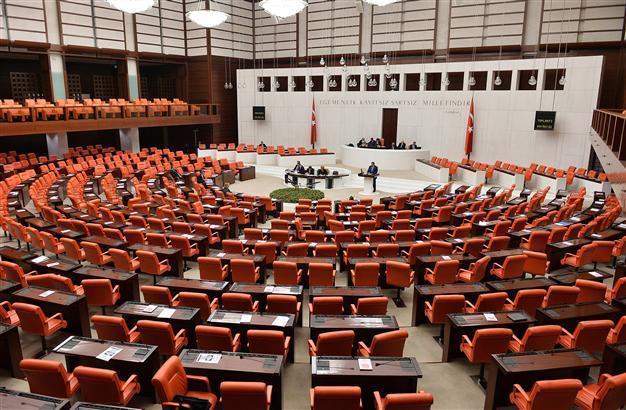Turkey's parliament to convene, setting the stage for a hot political summer
Bülent Sarıoğlu - ANKARA

HÜRRİYET Photo
A very hot political summer is set to begin June 23, when Turkey’s new parliament will convene for an oath-taking ceremony, which will be followed by an intense period of bargaining between the four political parties over the formation of a coalition government.President Recep Tayyip Erdoğan reiterated he will give the mandate to form a government after the parliament speaker is elected, meaning the 45-day period will likely begin in the first week of July.
All 550 lawmakers will be present at parliament on June 23 at 3:00 p.m. to take their oaths to officially become deputies elected for a four-year term. This session will be chaired by Deniz Baykal from the ranks of the Republican People’s Party (CHP), as the oldest member of parliament, while the six youngest members will serve as clerks.
The first task on parliament’s agenda is to elect its speaker and members of the council. Those who want to run for the number two position of the Turkish state have until midnight on June 27 to apply, as the first round of voting will take place on June 28. Contenders have to reach a two-thirds majority in the first two rounds, while a simple majority is sufficient in the third round of voting.
First partnership for the speaker post
As none of the four political parties have a simple majority, the election of the parliament speaker will require a final fourth round of voting, in which the candidate with the most votes will be elected. In this case, a Justice and Development Party (AKP) candidate will be elected if the three opposition parties cannot compromise and agree on a name.
The speaker position is important for two reasons. The first is that the speaker serves as acting president in the absence of the head of the nation and the second is he plays a very strategic role in parliamentary processes, such as forming commissions to investigate corruption claims against government members, which is why the AKP’s priority is to keep this strategic position in their hands. However, it can also offer it to its coalition partner in accordance with the bargaining process.
However, although less likely, in the case the three opposition parties can agree on a candidate, they can have their common candidate elected in the third round.
According to Turkish political customs, the bigger partner in a coalition takes the prime ministry while the smaller partner receives the position of the parliament speaker. But as the speaker is elected for a two-year term, the two coalition parties can also agree on a rotation.
When will the 45-day period begin?
The new parliament speaker is expected to be elected no later than July 2 and Erdoğan is expected to give the mandate to Prime Minister Ahmet Davutoğlu on either the same day or shortly after. This will launch the 45-day period to form the government, which is expected to end in mid-August. Davutoğlu is planning to form his government within 15 days before returning the mandate to Erdoğan. In the case no government is formed in 45 days, Erdoğan will call for early elections to take place in 90 days. In this sense, the elections could be repeated Nov. 15 under the rule of an interim government composed of four political parties according to their proportions.
















